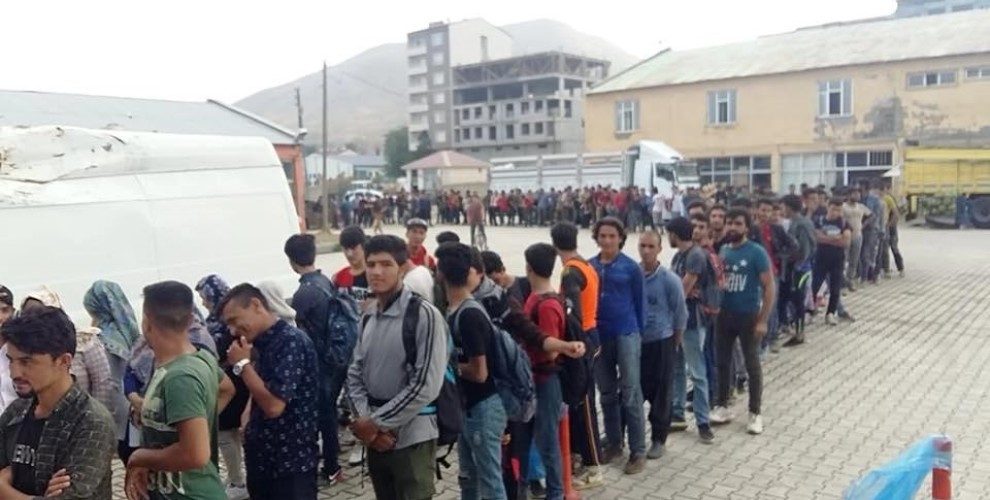Refugees moved to Kurdish provinces
There is a recent surge in refugees arriving in Kurdistan. With refugees brought in from elsewhere in the country, the state is attempting to change the demographics of Kurdish provinces.
There is a recent surge in refugees arriving in Kurdistan. With refugees brought in from elsewhere in the country, the state is attempting to change the demographics of Kurdish provinces.

Thousands of people aged between 15 and 25 for the most part have been brought and settled in Kurdish provinces as part of a deliberate policy by the Turkish state.
Hundreds of refugees arrive in Kurdish provinces every day, and the Turkish state settling these refugees in cities like Van and Bitlis is reminiscent of the Eastern Reformation Plan implemented in 1925 to Turkify Kurdish settlements.
In 1925, Mustafa Kemal Ataturk and Ismet Inonu had implemented the Eastern Reformation Plan as part of the assimilation policies in Bitlis, Van, Hakkari, Agri and various other provinces in Kurdistan. According to this plan, Turks were to be brought in from various provinces in Turkey to Turkify Kurdistan. After this date, the Turkish state intensified and increased their sanctions against the Kurds. The same day, the Maintenance of Order (Tahrir-i Sükun) Act was passed, which marked the beginning of a new and difficult time for the Kurdish people. The Kurdish people were faced with mass executions, forced migrations, forced sterilization and linguistic and cultural prohibitions. The state attempted to deteriorate the ethnic structure of the Kurdish lands.
INONU’S GENOCIDE REPORT
The genocide report prepared by Ismet Inonu includes the following information: Kurds must be prevented from settling in cities. To reduce the influence the Kurds have, migrants must be brought in from the Black Sea. (The report for instance mentions Turks from the Black Sea region settled in Van, and demands that they be taken care of. Thus, the arrival of other migrants into Kurdish regions were to be made easier.) The regions divided up as Turkish and Kurdish cities must receive different services. No schools should be opened in Kurdish areas yet, if schools are to be opened, it should be for Turks, and as a next priority schools should be opened in areas that have been Kurdified, but could learn Turkish faster. A good administration must be set up in border areas like Mardin, Urfa and Hakkari against France and other countries. Kurds must be prevented from settling in evacuated Armenian villages. Kurds must be assimilated. Turkish centers must be set up against the Kurds’ power of attraction. The Kurdistan area must be controlled with the chemindefer (railroad). Dersim must be interfered with. Smuggling must be prevented and Kurds must be prevented from achieving political power.
INTERFERING WITH THE DEMOGRAPHICS
A similar assimilation policy to 1925 is being implemented in Kurdish provinces today. Thousands of refugees have been brought in to the Tatvan district in Bitlis. The refugees are from Afghanistan, Kyrgyzstan, Turkmenistan and other Central Asian Turkic republics. The people brought in to Tatvan under Turkish state supervision are to be settled in Tatvan and other Kurdish cities. With its population of 100.000, the arrival of thousands of refugees to Tatvan is said to be a policy geared towards changing the demographic structure of the district. The refugees brought to Bitlis before had been settled in the Adilcevaz district.
The streets of Tatvan are filled with refugees. Citizens say large groups of foreign-born people have been brought in to Tatvan recently and add: “Especially after the war in Syria, refugees started coming in. There has been a great surge in the number of refugees after the June 24 elections. There weren’t many refugees in Tatvan before, but now it is as if a hand is deliberately bringing them here. We as the people believe that this is deliberate. The goal is to change the demographic structure of Bitlis. They tried these policies before, but couldn’t get results.”
The Kyrgyz people brought in by Kenan Evren in 1982 to change the demographic structure of the region were settled in state-confiscated areas where the Zilan Massacre happened. The Kyrgyz village today has the highest number of village guards.